Power is important during travel. Determine your power needs and find out what size generator your need for your RV.

Our last motorhome had one of those built-in generators, which was pretty slick. The downside was when I had to do some work on it, it was difficult to access. Our current motorhome doesn't have a spot for a built-in unit, leaving us to determine our needs and buy our own unit.
Power units for your devices and generator
First let's briefly talk about the units of measurement.
Volts – the voltage is going to be 120v, 240v, or combined 120/240v in North America. Most RVs run on 120v. A generator that can output 120/240 can still be used for a 120v RV.
Amps – this is the current, how fast electricity is moving through the wires. It's independent of voltage. A little AA battery could output 1.5 volts at 1 amp. A device that plugs into your wall could draw 120 volts at 1 amp. Both draw the same 1 amp, but use different amounts of power due to the voltage.
Watts – this is the rate of power being used. You can simply multiply the volts and amps to determine the power rate. 1.5 volts at 1 amp is 1.5 watts. 120 volts at 1 amp is 120 watts.
Note: this is technically volt-amps on AC systems, which is a different measurement than watts, but it's always safe to simply use power as calculated above. The difference is in how alternating current (AC) power works at a detailed level, but using the simple multiplication will always be the most conservative (safe) number to use.
Watt-hours – this is an absolute amount of electrical power used. It's a simple multiplication of volts by amps by hours used. Running a device at 120 volts, 1 amp, for 3 hours uses 360 watt-hours. This becomes important when looking at battery systems, but not important with generators because you expect to run the generator continuously while using the power.
Determine your high-power needs for generator size
The best place to begin is at the high power devices. This will determine the minimum power requirements for your unit. There's no point in buying a little 900 w generator if you plan on running a 1500 watt coffee maker, right?
Running Air Conditioning on a Generator
This is a big one. An AC unit draws a lot of power. A lot of travel trailers and motorhomes have one or more of those big ceiling units. This type of RV air conditioner is often on a 20 amp circuit, but draws more like 12 - 15 amps once it's running.
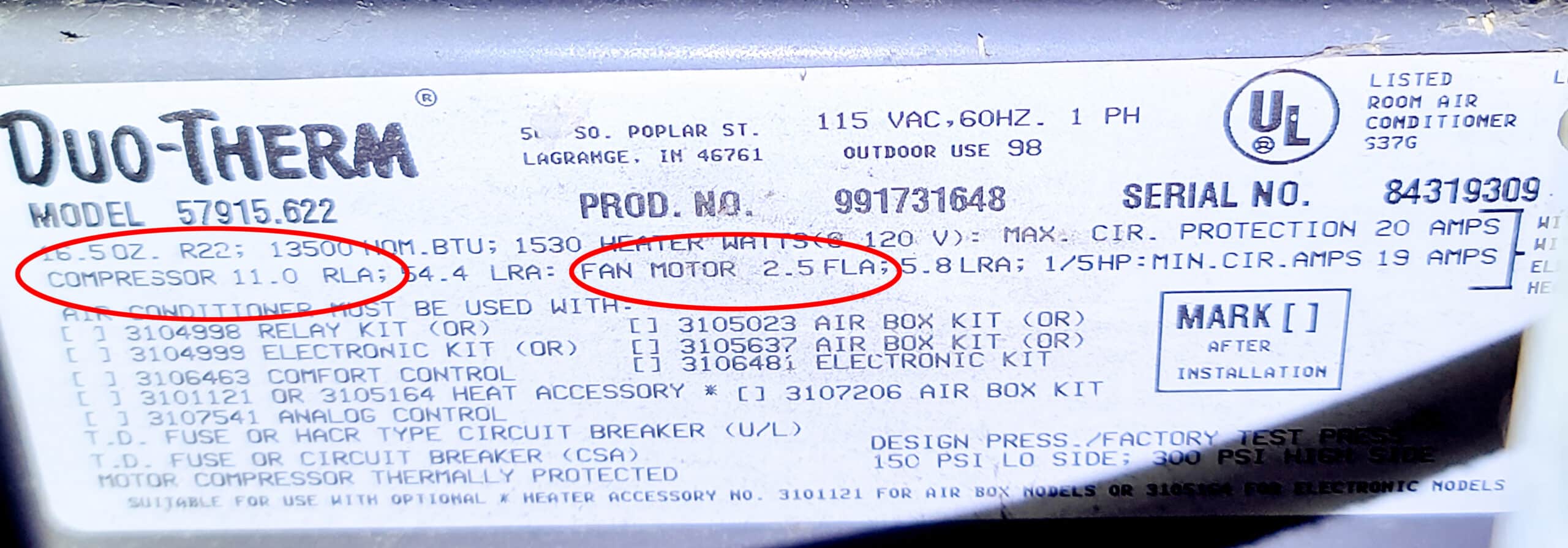
Starting up a big motor, like the one found in your air conditioner, takes lots of extra power. A general rule of thumb is that it can draw three times the standard running power during the first few seconds.
This is an over-simplification, but it gives a general idea of what is going on. In my experience, using a 2x multiplier is totally safe. Using a 1.5x multiplier is usually safe, but some equipment will struggle with this.
Now convert your numbers to watts to work towards determining what size generator you will need
this generator.Our big RV air conditioner draws about 12 amps once running, around 1400 watts. I measured this using an ammeter similar to this ammeter. According to my math my generator should be able to output at least 2100 watts using the 1.5x multiplier.
I tested the P2200 to see if it would start up the air conditioner. Yes, it did! It really struggled, it hated it, but it worked. The only issue is that it doesn't really leave any room for any other electrical usage. We'll get into that more later.
Air conditioning is the most challenging thing to calculate. I started out wit this on purpose. If you're still with me here, don't worry, it gets easier from here on out.
Sometimes the label isn't easy to figure out. If you don't have a means to measure the power, you can add the compressor current and fan current together. In my case the compressor current is 11.0 amps, and the fan is 2.5 amps. This means it expects to draw 13.5 amps. My measured value of 12 amps is fairly close, and could simply be the result of a little different voltage at my house than their test lab.
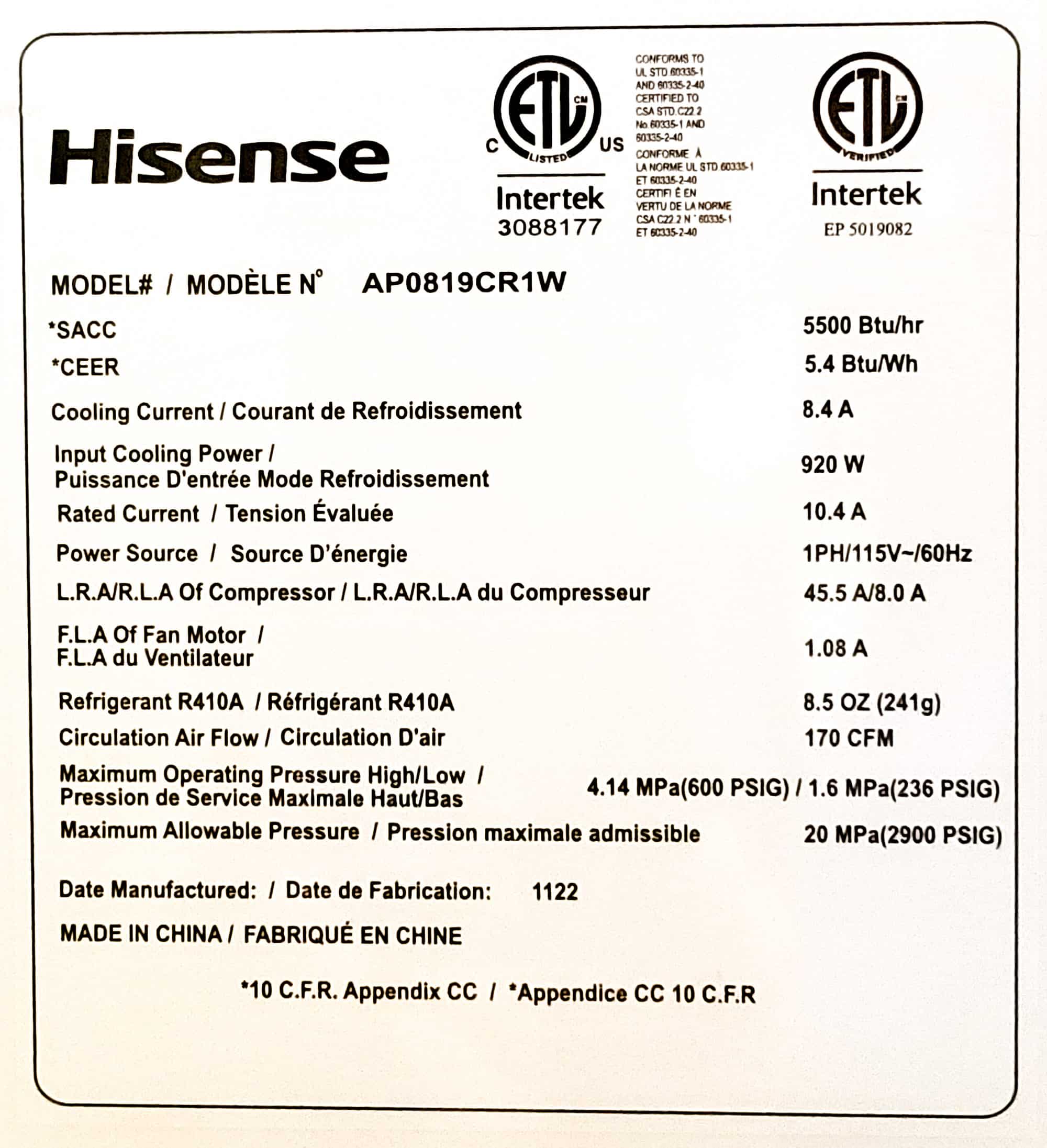
Heating devices on a generator - size can grow quickly!
Heating appliances take a lot of power. These are typically space heaters, coffee makers, hair dryers, and microwave ovens. Other kitchen appliances may take a lot of power, such as the hot plate we use. Take a look at the labels on these electronic devices and write down their power usage.
These devices don't need the multiplier for starting, like we used on the air conditioner. That's because these are resistive loads, as opposed to the inductive load of an air conditioner motor. There are some components of inductive load on these, but we can safely ignore them.
One exception to this is a heat pump. A heat pump is an air conditioner in reverse, so it has the same inductive load as an air conditioner. Heat pumps are not common in RVs unless the system has been upgraded.
In our case, our coffee maker drives our need at 1520 watts. Our hot plate is 900 watts each, microwave oven is 1300 watts, and our griddler is 1500 watts.

Now you should have a short list of high-power items. Don't worry about adding them up or anything, we'll talk about that soon.
Add up your low power devices for your generator size calculation
For the lower power items, we're going to add up some numbers. Don't worry about getting everything exact here, we're just looking for an estimate.
Our fridge pulls about 3 amps when running on shore power. Our two laptops and charging devices pull about 1 amp when in use. Our fan draws 1 amp. The RV power converter draws around 1 amp for lights and maintaining the batteries that are charged. Add another 2 amps if the batteries need some charging.
All told those smaller things add up to 8 amps. 12 amps at 120 volts is around 1000 watts. Whoa, that's a lot of power output for the small devices! How can we trim it?
The easiest way is to keep our fridge on propane power. That 3 amps is over 300 watts. We have a big old tank of propane attached to the truck already, why buy a bigger generator just to avoid using propane? Propane power is great because propane doesn't go bad over time. The fridge only uses a tiny bit of electricity when using propane for the primary fuel

Now I'm down to 3 amps if the batteries are still charged, or about 350 watts. That's much better!
Determine what has to run off the generator at the same time!
This is another really big one. What has to run at the same time? For me, I want to keep all of those small things on, that 3 amps of power. I don't really want to run around unplugging things to make some coffee.
We're okay running only one big power thing at a time. I just brew my coffee, then microwave my leftovers for breakfast as soon as it's done. It barely takes any thought, and it cuts our required generator size way down.
Our 1520 watt coffee maker plus our smaller needs at 350 watts is 1870 watts. This is slightly over the rating of 1700 watts on our generator, but remember, it can handle extra power for short times.

If I want to run the coffee maker over and over (sometimes we'll use it to get near-boiling water for cooking), then I just kick off the fan, maybe turn off the RV power converter, and there's plenty of power to use.
For the air conditioning, we have a small portable 8000 btu AC in the bedroom. It draws less than 1000 watts, so it's no problem to run from the generator along with our smaller needs. As stated above, I simply turn it off for a few minutes if I need to use another high-power electronic device.
Ok, hopefully I've convinced you that you don't need a 15,000 watt generator for your RV. If you do, that's fine, but there are some advantages to smaller units as we'll discuss below.
Other considerations besides size
I know this is about the size of the generator you need, but I want to touch on some other aspects. These are important considerations when choosing a generator.
Fuel type
Gasoline is the most common fuel for small generators, but you'll also find diesel generators, natural gas or propane generators, or even multi-fuel models.
I think it's important to try to synchronize fuels as much as possible. Our motorhome runs on gasoline. Even though diesel has a higher fuel efficiency, I don't want a diesel generator.
My 5-gallon gasoline tank can be used as emergency fuel for the RV, or I could use my fuel siphon pump to pull gasoline from my motorhome tank to use for my generator.
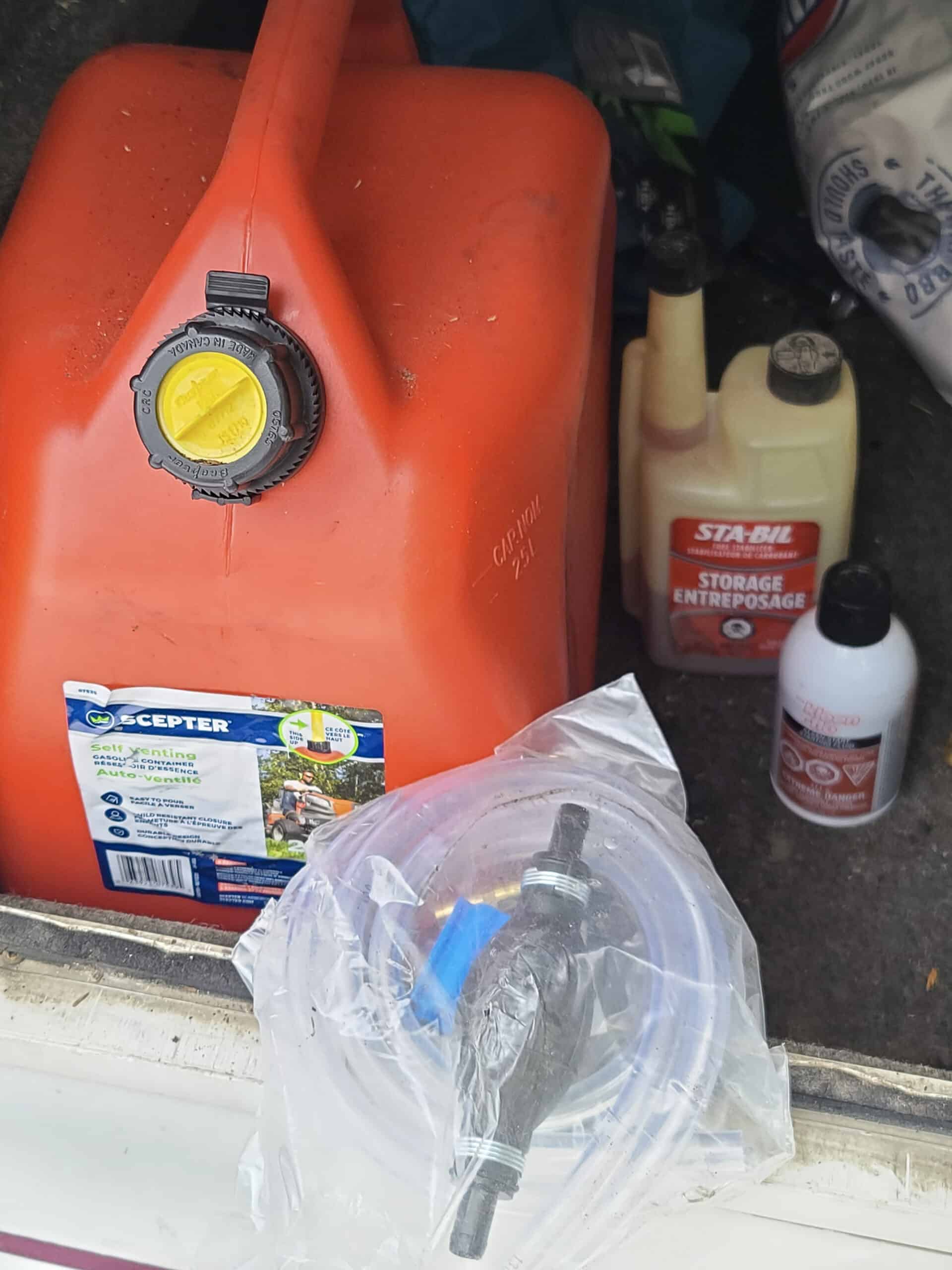
My home generator runs on gas, but I purchased a new carburetor to allow it run on natural gas or propane. It'll get less power with them, but it's a good option in an emergency situation.
You might hear about solar generators, but that's really just a marketing term. It's a standard solar setup with solar panels, a charge controller, and a battery pack. Something marketed as a solar generator is probably a nicely packaged setup for easy travel.
There's nothing wrong with this, but compare them to the smaller generators. You won't get high-power for very long on them. Check out our article on determining your solar power needs if you're interested in that route.
Also consider your sunlight availability. Shaded camp sites or rainy days means little or no power from them. Personally I think they're best suited for tent setups and supplementary systems.
Generator noise
Take a look at the noise level of the units you're considering. Lower cost brands are often noisier than their brand-name counterparts.
Inverter generators are quieter than standard generators because the engine runs slower when less power is being used. At full power it may have similar noise to a conventional unit.
Volumetric size of generator matters
Both weight and volume are important, even though we have one of the larger RVs available. I carry my generator in to the woods if available, and chain it to a tree. Lighter is better.
I keep mine in my rear storage area where I have a lot of other gear to carry. Lifting a heavy generator would really be difficult. Taking up a lot of room would mean less storage for other things. Smaller is better.

I do have a larger generator at home, as emergency backup for extended power outage. It's extremely heavy and I'm quite glad I don't have to lug that around to get enough power. Also it's quite loud so it gets annoying depending on the run time.
Pull start versus electric start generators
Being an able-bodied person, I am generally of the mind to save some money and buy a pull-start generator. Don't forget though, something like this is an investment.
In five years will I get sick of the pull start and wish I had thrown down a few buck more for a battery start? Buying a new generator in a few years to get this option will cost much more overall.
Final Thoughts on generator size
Having some kind of generator is a really good idea, but what size is best? The best option in my opinion is a small generator that barely gives you as much electricity as you need.
If you think you might upgrade your RV system or get other devices, consider a more powerful generator. An inverter generator is best, and some allow you to link two together for more power. This can be a good backup if you later decide you need a larger unit.
Add up the total wattage of your devices that run at the same time. See where you can trim or temporarily unplug. Then you can see how much power you truly need.
If you're replacing a built-in RV generator, consider obsoleting it and just using a portable unit. You can still link it in to your 30-amp RV connection (or 50-amp RV connection if you have a big unit) via adapters.
Make sure to have plenty of fuel to run for a given time, which will depend on your camping needs. I like to have a backup option, so I have a gas siphon for emergency use.
Last, don't forget your starting wattage for inductive loads – your air conditioner. It'll pull a lot of power for a few seconds so check your generator rating and air conditioner power needs.
Share the Love!If you’ve made one of our recipes, be sure to take some pics of your handiwork! If you post it to Bluesky, be sure to tag us - @2NerdsInATruck, or you can tag us on TikTok, if you’re posting video. We're also on Pinterest, so you can save all your favourite recipes and park reviews to your own boards! Also, be sure to subscribe to our free email newsletter, so you never miss out on any of our nonsense. Well, the published nonsense, anyway! |




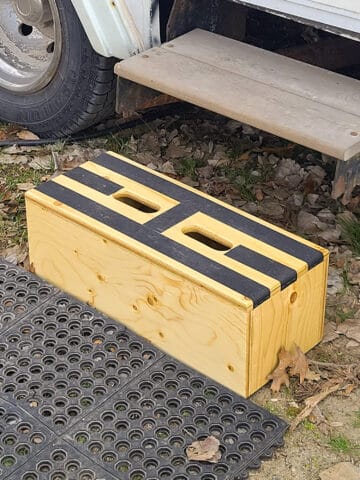
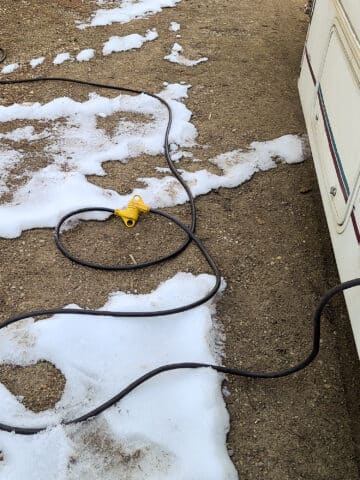
Leave a Reply